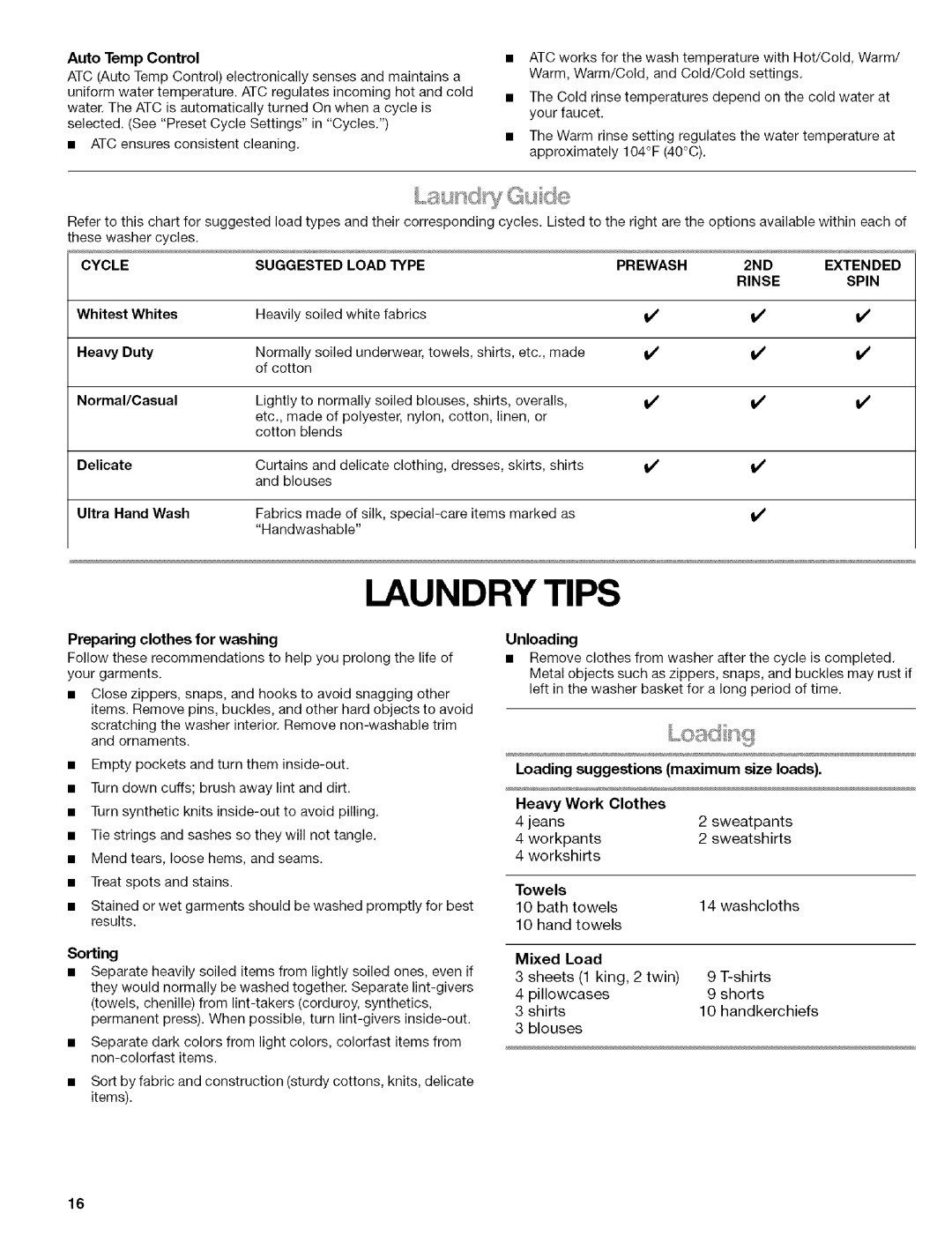
Auto Temp Control |
|
|
|
| • | ATC works for the | wash temperature | with Hot/Cold, Warm/ |
ATC (Auto Temp Control) electronically | senses and | maintains | a |
| Warm, Warm/Cold, | and Cold/Cold settings. | ||
uniform water temperature. | ATC regulates incoming | hot and | cold | • | The Cold rinse temperatures depend | on the cold water at | ||
water. The ATC is automatically turned | On when a cycle is |
|
| your faucet. |
|
| ||
selected. (See "Preset Cycle Settings" | in "Cycles.") |
|
|
|
|
| ||
|
|
| The Warm rinse setting regulates the water temperature at | |||||
• ATC ensures consistent | cleaning. |
|
|
| • | |||
|
|
|
|
|
| |||
approximately 104°F (40°C).
Refer to this chart for suggested load types and their corresponding cycles. Listed to the right are the options available within each of these washer cycles.
CYCLE |
| SUGGESTED | LOAD TYPE |
|
|
| PREWASH | 2ND | EXTENDED | |
|
|
|
|
|
|
|
|
| RINSE | SPIN |
Whitest | Whites | Heavily soiled | white fabrics |
|
|
| I/ | I/ | I/ | |
Heavy | Duty | Normally | soiled underwear, towels, | shirts, etc., | made | I_ | I_ | I_ | ||
|
| of cotton |
|
|
|
|
|
|
|
|
Normal/Casual | Lightly to | normally soiled blouses, | shirts, | overalls, | I_ | I_ | I_ | |||
|
| etc., made of polyester, nylon, cotton, linen, or |
|
|
|
| ||||
|
| cotton blends |
|
|
|
|
|
|
| |
Delicate | Curtains | and delicate clothing, dresses, | skirts, | shirts | I/ | I/ |
| |||
|
| and blouses |
|
|
|
|
|
|
| |
Ultra Hand Wash | Fabrics made | of silk, | items | marked as |
| I/ |
| |||
|
| "Handwashable" |
|
|
|
|
|
| ||
LAUNDRY TIPS
Preparing clothes for washing
Follow these recommendations to help you prolong the life of your garments.
•Close zippers, snaps, and hooks to avoid snagging other items. Remove pins, buckles, and other hard objects to avoid scratching the washer interior. Remove
•Empty pockets and turn them
•Turn down cuffs; brush away lint and dirt.
•Turn synthetic knits
•Tie strings and sashes so they will not tangle.
•Mend tears, loose hems, and seams.
•Treat spots and stains.
•Stained or wet garments should be washed promptly for best results.
Sorting
•Separate heavily soiled items from lightly soiled ones, even if they would normally be washed together. Separate
•Separate dark colors from light colors, colorfast items from
•Sort by fabric and construction (sturdy cottons, knits, delicate items).
Unloading
•Remove clothes from washer after the cycle is completed. Metal objects such as zippers, snaps, and buckles may rust if left in the washer basket for a long period of time.
Loading suggestions (maximum size loads).
Heavy Work Clothes |
|
|
4 jeans | 2 sweatpants | |
4 workpants | 2 sweatshirts | |
4 workshirts |
|
|
Towels | 14 | washcloths |
10 bath towels | ||
10 hand towels |
|
|
Mixed Load |
|
|
3 sheets (1 king, 2 twin) | 9 | |
4 pillowcases | 9 | shorts |
3 shirts | 10 | handkerchiefs |
3 blouses |
|
|
16
